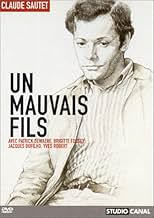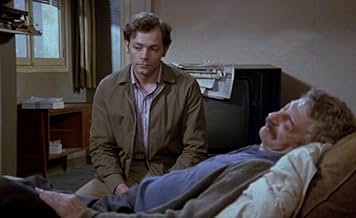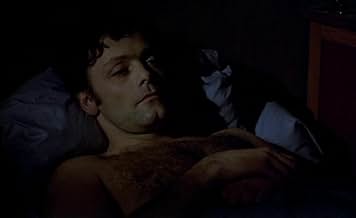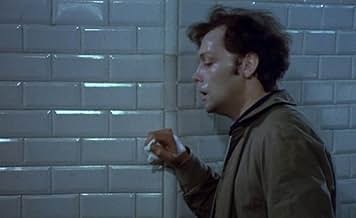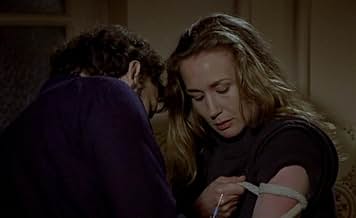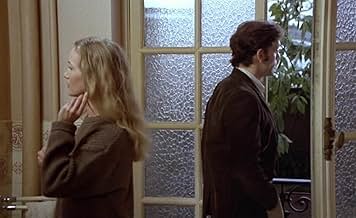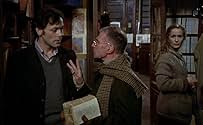AVALIAÇÃO DA IMDb
7,4/10
1,6 mil
SUA AVALIAÇÃO
Adicionar um enredo no seu idiomaBruno is released from prison. He looks for a job and tries to start a new life. His first stop is at his father's apartment.Bruno is released from prison. He looks for a job and tries to start a new life. His first stop is at his father's apartment.Bruno is released from prison. He looks for a job and tries to start a new life. His first stop is at his father's apartment.
- Direção
- Roteiristas
- Artistas
- Prêmios
- 1 vitória e 5 indicações no total
Avaliações em destaque
It is not a film to be explained, it is a film to be lived! It goes straight to the heart, simply to the essential. Exceptional in truth and authenticity with a great casting of exceptionnal actors. Wonderful!
This film has a beautiful density. Dramatic density, with each of the characters who are human beings, not clichés or stereotypes. Each one of them contributes to this story, simple, but rich, dense, where family, friends, lovers contribute to produce a beautiful drama. Patrick Dewaere returns from prison in the USA; he finds his father, Yves Robert, who could give the title of "a bad father" to the film, even if we understand him. The police help Patrick Dewaere to reintegrate. He then crosses the path of Brigitte Fossey (very good performance), also in rehabilitation following his drug addiction. He also meets Jacques Dufilho, who will help him to reintegrate.
The film could be called a beautiful story, with beautiful characters, poignant at times, but gripping, which accepts that everyone has good sides, or weaknesses, and are able to overcome them, or not. The script also mixes, without condescension or judgment, the universe of the father, a public works worker, and the employer for the reintegration, Jacques Dufilho, who is a bookseller and music lover. These worlds are articulated through the character of Patrick Dewaere.
In its kind, a perfect film, which does not leave indifferent, which knots the stomach of the spectator.
The film could be called a beautiful story, with beautiful characters, poignant at times, but gripping, which accepts that everyone has good sides, or weaknesses, and are able to overcome them, or not. The script also mixes, without condescension or judgment, the universe of the father, a public works worker, and the employer for the reintegration, Jacques Dufilho, who is a bookseller and music lover. These worlds are articulated through the character of Patrick Dewaere.
In its kind, a perfect film, which does not leave indifferent, which knots the stomach of the spectator.
It was the first time since "Max et les ferrailleurs "(1971) that Claude Sautet had left the bourgeois milieu for the working class people ;with the exception of the bookseller,an educated man :and even him is part (remember the film was made 42 years ago)of the margins of society ,because of his homosexuality (treated with a great sense of modesty).
The cast is not Sautet's usual suspects;and in this context , they are well chosen:Yves Robert as the blue collar father ,whose son is a bad lot (check the title),because his hasty departure "killed his poor mother" ; but further acquaintance shows that this daddy is not the noble samaritan whose only concern was to take care of a dying wife. Claire Maurier , par excellence the determined woman ,perhaps the only character who has kept some kind of joie de vivre ; the emigrated worker , an exiled , par excellence a man who lives of the fringes of a society not prepared to accept him ,and who becomes the hero's best friend. The gay bookseller ,fond of opera -the only touch of the privileged life Sautet had depicted so many times in the seventies (Cesar,Rosalie ,Vincent,François ,Paul,Mado et les autres ,'in danger of despair" ,to quote the director himself a propos his 1974 effort)- acts like an adoptive father,not only for Bruno but also for Catherine ,an ex-junkie ,so-called clean but extremely frail ; Catherine is probably the weakest link of the chain : badly written :the sullen grumpy girl who inevitably falls in the hero's arms ,how many time has the average viewer seen that, since "it happened one night" (1934);Brigitte Fossey was a memorable child actress ("jeux interdits "= forbidden games) who resumed her career when she became an adult ;she's perhaps too cerebral in this context.....
But it's no coincidence if Sautet paired her with Patrick Dewaere ,himself a child actor on stage,whose brilliant career was brutally interrupted when he committed suicide :it was a major loss for the French cinema ;no other actor was at once frail and strong as he was and he was not replaced in this field ;his hangdog looks , his eyes are always longing for something he's always denied ;with the exception of Romy Schneider -who disappeared in 1982 ,like him- no other actor moved me more deeply than him in Sautet's movies.
Dewaere portrays a looser,an ex-convict who spent five years in an American jail for drug-trafficking and comes back to his native land to find his father apparently compassionate but cold and resentful ,a country in a state of crisis where unemployment runs rampant ; the ending is not that much optimistic as certain critics claim ; it is an open one, and it rather indicates that the fight has only begun for Bruno.
The cast is not Sautet's usual suspects;and in this context , they are well chosen:Yves Robert as the blue collar father ,whose son is a bad lot (check the title),because his hasty departure "killed his poor mother" ; but further acquaintance shows that this daddy is not the noble samaritan whose only concern was to take care of a dying wife. Claire Maurier , par excellence the determined woman ,perhaps the only character who has kept some kind of joie de vivre ; the emigrated worker , an exiled , par excellence a man who lives of the fringes of a society not prepared to accept him ,and who becomes the hero's best friend. The gay bookseller ,fond of opera -the only touch of the privileged life Sautet had depicted so many times in the seventies (Cesar,Rosalie ,Vincent,François ,Paul,Mado et les autres ,'in danger of despair" ,to quote the director himself a propos his 1974 effort)- acts like an adoptive father,not only for Bruno but also for Catherine ,an ex-junkie ,so-called clean but extremely frail ; Catherine is probably the weakest link of the chain : badly written :the sullen grumpy girl who inevitably falls in the hero's arms ,how many time has the average viewer seen that, since "it happened one night" (1934);Brigitte Fossey was a memorable child actress ("jeux interdits "= forbidden games) who resumed her career when she became an adult ;she's perhaps too cerebral in this context.....
But it's no coincidence if Sautet paired her with Patrick Dewaere ,himself a child actor on stage,whose brilliant career was brutally interrupted when he committed suicide :it was a major loss for the French cinema ;no other actor was at once frail and strong as he was and he was not replaced in this field ;his hangdog looks , his eyes are always longing for something he's always denied ;with the exception of Romy Schneider -who disappeared in 1982 ,like him- no other actor moved me more deeply than him in Sautet's movies.
Dewaere portrays a looser,an ex-convict who spent five years in an American jail for drug-trafficking and comes back to his native land to find his father apparently compassionate but cold and resentful ,a country in a state of crisis where unemployment runs rampant ; the ending is not that much optimistic as certain critics claim ; it is an open one, and it rather indicates that the fight has only begun for Bruno.
Claude Sautet's films are always rich in introspective thought, whether the subject is the fragility of existence (Les choses de la vie), the unconditional love of a man toward a woman that wants out of a relationship (César et Rosalie) or the everyday struggles to make it through ordinary existences (Vincent, François, Paul et les autres). In Un mauvais fils, Patrick Dewaere is paradoxely a good person who has made very bad decisions, but now wants to make amends and get a better life, all the while his father is still grieving the death of his wife.
Remarkably, while being usually casted in loser roles, Dewaere redeems himself from loser status to become a good son, a reliable worker and a strong support of his addicted girlfriend. It's too bad that we lost this prodigious actor too early, struggling himself with addiction and depression.
Remarkably, while being usually casted in loser roles, Dewaere redeems himself from loser status to become a good son, a reliable worker and a strong support of his addicted girlfriend. It's too bad that we lost this prodigious actor too early, struggling himself with addiction and depression.
If Claude Sautet is most known for his films about middle class, he signs there an excellent movie about the father-son relationship, both belonging to the working class.
Patrick Dewaere is the "bad" son, returning home from the US and prison, with a drug addict and trafficker past. He's great, just right the whole movie. As always, I'm tempted to say.
Yves Robert, the father, is a discovery for me as an actor and a good surprise. I knew him merely as director - he directed a handful of popular success. His play was at Dewaere's height and scenes with both of us together a real delight.
The supporting roles, with Brigitte Fossey and Jacques Durilho, are also very good and give us some of the nicest scenes (the opera!).
The movie in itself stays a classic Sautet if I can say, even in this different settings, letting place to the characters, time to take its course. Showing the simple things of life. Kindliness for his characters. Caring for the little details. I don't know if this is because he is focused on this relationship and not on the description of a certain world, or if this is because he films a social background he knows less and with a generation that is not his, but it works really well, better than most of his middle-class movies.
If the misunderstanding between father and son is the motor of the movie, everyone knowing them, including the spectator, can only witness how similar they are but never at the same wavelength. Sautet adds nice secondary plots and manages a beautiful movie until a wonderful ending.
The movie in itself stays a classic Sautet if I can say, even in this different settings, letting place to the characters, time to take its course. Showing the simple things of life. Kindliness for his characters. Caring for the little details. I don't know if this is because he is focused on this relationship and not on the description of a certain world, or if this is because he films a social background he knows less and with a generation that is not his, but it works really well, better than most of his middle-class movies.
If the misunderstanding between father and son is the motor of the movie, everyone knowing them, including the spectator, can only witness how similar they are but never at the same wavelength. Sautet adds nice secondary plots and manages a beautiful movie until a wonderful ending.
Você sabia?
- Citações
Bruno Calgagni: They're part-time hookers. They'll give us a cut rate because we're two. Let's ask them over.
- ConexõesFeatured in Claude Sautet ou La magie invisible (2003)
Principais escolhas
Faça login para avaliar e ver a lista de recomendações personalizadas
- How long is A Bad Son?Fornecido pela Alexa
Detalhes
Bilheteria
- Faturamento bruto mundial
- US$ 351
Contribua para esta página
Sugerir uma alteração ou adicionar conteúdo ausente


![Assistir a Bande-annonce [OV]](https://m.media-amazon.com/images/M/MV5BNGFhMzFmOTEtMzdiZi00NWQzLTg3YTMtNjU0MjIwZWRhMmFiXkEyXkFqcGdeQXRyYW5zY29kZS13b3JrZmxvdw@@._V1_QL75_UX500_CR0)
